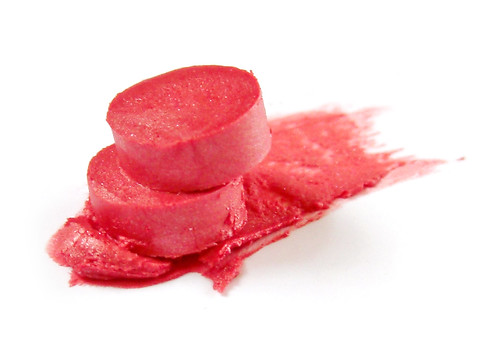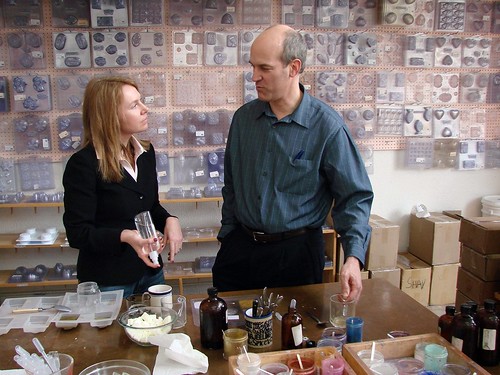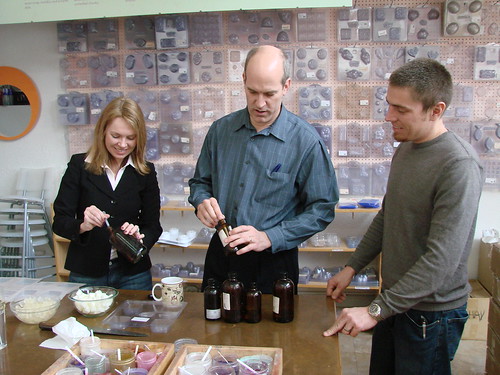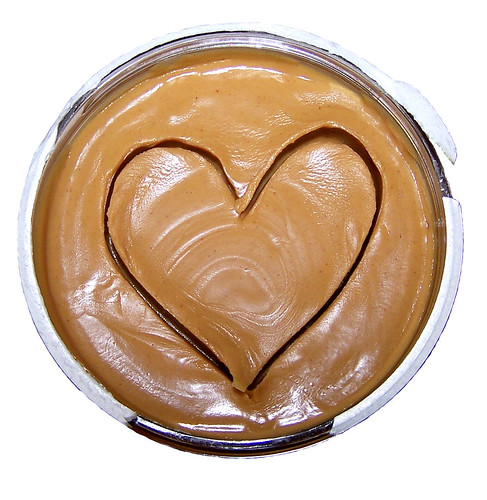Tutorials on soapmaking, bath fizzies, lotions and more
Filed Under: Bramble Berry News
Filed Under: Personal Ramblings
Hi Happy Soapers, I’m in Washington DC (after two long flights) with Donna Maria (Indie Beauty Network), Lela Barker (Bella Lucce), Leigh O’Donnell (The Handcrafted Soap Guild) and Kayla Fioravanti (Essential Wholesale). We’re here to advocate on behalf of indies everywhere. Our goal is to educate the staffers and representatives behind HR 5786 (The full version of the draft bill for you to read is here.) Our meetings start tomorrow and we’re hopeful, positive and forward moving.
Filed Under: Business Musings
Filed Under: Business Musings
I listened to the bulk of the Colorado hearings over House Bill 1248 yesterday (for an overview, check out the blog post here). The bill would have banned a variety of ingredients, including trace amounts of chemicals, in personal care products. On the face of the bill, it sounded great – less chemicals is a good thing right? Chemicals = Bad. Natural = Good. The problem with that sort of simplistic thinking was that in the rush to ban chemicals, some of the science and practical ramifications of the ban were overlooked.
The bill failed to get out of committee – 4 votes to 7 – for a few reasons:
1. We’re not the E.U.
Those testifying for the bill asserted that European Union had safer personal care products and that the United States should follow along in their footsteps. There was spirited discussion about whether the U.S. should follow bills from the E.U. or even model our laws after the E.U. laws. The bill, as it was written, would have allowed the E.U. to add or take away from the list of ‘acceptable’ chemicals that were used in products in Colorado.
2. Trace elements were not allowed.
Many natural products that come from the earth have trace elements in them. These elements occur in levels that are minimal or in such small amounts that they do not have anything near the levels that you would need to be exposed to in order to have a negative effect. Even apples contain trace amounts of Acetaldehyde! So if this bill had passed, we could *eat* the apple but not grind it up and put it in a fresh face mask. From Indie Beauty Blog:
This point was driven home when Dr. Richard Adamson (testifying on behalf of the Personal Care Products Council), said that in order for lip sticks that contain trace elements of lead to be injurious to human health, one would have to eat (yes, literally eat) 3-4 tubes of it a day for 70 years before it could become potentially harmful.
Dr. Adamson also said of 1,4-dioxane (which can be used as a foaming agent in cosmetics), one of the substances that would have triggered the law, that one would have to take 700 baths a day for 70 years in order for the substance to become potentially harmful to a human being.
3. Science did not back up the ban
Many testified that it seemed like a good idea to ban the chemicals, stating that we shouldn’t wait for the science to prove that the chemicals caused cancer, that instinctively, we should just know that they did. Lawmakers proved unwilling to put 1000’s of Avon and Mary Kay representatives out of business based on feeling rather than fact. From Indie Beauty Blog:
This troubled lawmakers greatly, and for good reason. Everyone who testified, both for and against the bill, repeatedly stated that the science is simply not there to say that any substance used in cosmetics causes cancer or reproductive problems, even if that substance has been determined to be toxic somewhere in the world under some testing condition.
4. It was a boon for the lawyers.
This law was not regulated by a governing body, instead leaving it up to individual citizens to find products containing the ‘bad’ ingredients and sue the manufacturer. This would be great for lawyers, not so great for the court system. In California, lawsuits from Proposition 65 have cost over $406 million, most of it going to lawyers.
In closing, I am thankful that this overly broad legislation was not passed. It would have affected far too many business owners in Colorado during a time when the economy needs small business more than ever. People in Colorado can vote with their dollars; they have a choice when purchasing personal care products. There are many, many natural cosmetic and toiletry companies in Colorado selling alternatives so that the entire spectrum of personal care is available.
Filed Under: Personal Ramblings
In accordance with the Federal Trade Commission Guildlines Concerning the Use of Endorsements and Testimonials in Advertising, here are my disclosure policies:
1. I often blog about raw materials that can be purchased at Bramble Berry, a for-profit organization I founded in 1998. I am the CEO of Bramble Berry.
2. If a product or service I blog about was given to me or purchased at a discount, I will disclose it. As a general practice, I purchase all the items I review on the blog.
3. I am the President of ELF Industrial, the Owner of Otion Soap and maintain the site TeachSoap.com
4. Blog commenters are not required to log in. Healthy discussion is encouraged; rude or disrespectful comments may be deleted.
5. At my discretion, I delete comments that are obvious spam, advertising or are rude. I reserve the right to edit comments. I delete all comments that are thinly veiled (or not) efforts to promote your products or services at my blog. I have removed the “no follow” designation from my comments so that you enjoy SEO credit for the link you share with your comment. I did this because I want my blog community to receive a boost from participating here. But if your comment, in my discretion, is opportunistic in nature, seeking to use the comment area as a free ad for your products, your comment will be deleted without notice to you. If you’d like to advertise, let me know and I can set you up through my paid sponsorship program.
Filed Under: Business Musings
Lipstick vs. Water vs. Candy
Let’s just say that long before the lipstick is going to kill you the water will have done you in. Even your favorite candy will kill you before the lipstick does. I’m sorry to say that if you are going to follow the direction of Skin Deep and throw out your lipstick then you are going to need a very large trash can. Make sure you clear your home of all water and any other drink that has water in it, chocolate and candies of any kind.

“Federal standards initially limited the amount of lead in water to 50 parts per billion (ppb). In light of new health and exposure data, EPA has set an action level of 15 ppb. If tests show that the level of lead in your household water is in the area of 15 ppb or higher, it is advisable – especially if there are young children in the home – to reduce the lead level in your tap water as much as possible
. (EPA estimates that more than 40 million U.S. residents use water that can contain lead in excess of 15 ppb.)” (source: EPA)
Obviously the FDA has a lower threshold limit for lead and yet they are being beat up by Skin Deep once again. The FDA allows 20 ppm lead in straight undiluted FDA approved colors. But there is not a lipstick on earth that is 100% color. Most colors have even lower than 20 ppm lead and every batch of color must be approved by the FDA before it goes to market.
On September 2, 2009 the FDA updated their website: Lipstick and Lead: Questions and Answers
An important section of the update is included here:
“How has the FDA followed up on the latest reports?
FDA scientists developed and validated a highly sensitive method for the analysis of total lead content in lipstick and applied the method to the
same selection of lipsticks evaluated by the CSC. FDA found lead in all of the lipsticks tested, ranging from 0.09 ppm to 3.06 ppm with an average value of 1.07 ppm. FDA concludes that the lead levels found are within the range that would be expected from lipsticks formulated with permitted color additives and other ingredients that had been prepared under good manufacturing practice conditions.
An article on FDA’s testing method was published in the July/August 2009 issue of the peer-reviewed Journal of Cosmetic Science.1 The article includes results for lead in all the lipsticks we tested. FDA’s testing method is now available for use by any suitable analytical laboratory for the determination of total lead in lipstick.

Is there a safety concern about the lead found by the FDA in lipsticks?
No. FDA has assessed the potential for harm to consumers from use of lipstick containing lead at the levels found in its testing. Lipstick, as a product intended for topical use, is only ingested incidentally and in very small quantities. FDA does not consider the lead levels that it found in the lipsticks to be a safety concern. FDA also notes that the lead levels that it found are lower than limits recommended by other public health authorities for lead in cosmetics, including lipstick.
It has been reported that levels of lead in certain lipsticks exceed those for candy. Is this a fair comparison?
No. The FDA-recommended upper limit for lead in candy is 0.1 ppm. It is not scientifically valid to equate the risk to consumers presented by lead levels in candy, a product intended for ingestion, with that associated with lead levels in lipstick, a product intended for topical use and which is ingested in much smaller quantities than candy.” (Source: FDA.gov)
The test methods that the FDA used for the most recent study can be found here and are available to the public.
Does the FDA take lead seriously? Can we trust the FDA to look out for the best interest of consumers?
Yes and yes. The FDA has been actively involved in setting standards and recalling products based on levels of lead being too high. Examples are these recalls made by the FDA for lead contamination:
Dagoba Organic Chocolate Recalls“Eclipse 87%,” “Los Rios 68%,” And “Prima Matera 100%” Dark Chocolate Products Because of High Lead Levels
Cost Plus World Market RecallsRed, Blue, Green, and Yellow Speckleware Beverage Containers and Glass Water Tank For Potential Lead Exposure Risk
State Health Department Warns ConsumersNot to Eat Chaca Chaca, Lead-Contaminated Candy From Mexico
Speaking of Candy
What about the difference in allowed ppm of lead in candy vs. lipstick. The Environmental Working Group chose the level of candy to compare to instead of water. The numbers sure look more shocking when you compare ppm of lead in lipstick vs. candy at first glance. But a realistic look at consumption of just one piece of candy vs. lipstick exposure takes all the thunder out of the exposure. (See above chart)
Don’t give up candy yet! For more information on lead in candy read the FDA’s page: Supporting Document for Recommended Maximum Level for Lead in Candy Likely To Be Consumed Frequently by Small Children and Guidance for Industry: Letter to Manufacturers, Importers, and Distributors of Imported Candy and Candy Wrappers.
What does the FDA say on Lead Poisoning from Cosmetics? Read their web page dedicated to Kohl, Kajal, Al-Kahal, or Surma: By Any Name, a Source of Lead Poisoning.
Last Thoughts and Bottom Lines
Here is the bottom line – not one single case in U.S. medical literature of anyone getting lead poisoning or cancer from lipstick! For more information on why lead is found in food and lipstick read my blog post The Real Story on Lead and Cosmetics.
In her article Skin Deep activist Jane Houlihan says, “If it’s made for the lips and contains lead at levels that mandate a warning under California’s Proposition 65, why doesn’t the manufacturer take steps to reduce the lead in this “Made in China” lip gloss?” This question just goes to show how little Jane Houlihan and the Environmental Working Groups knows about cosmetics. California’s Proposition 65 requires that any product containing any one of 783 ingredients that trigger this warning statement put that warning statement on their label in order to sell cosmetics in California. The ingredients in theWink Strawberry Sangria Shimmer Lip Gloss that triggered the warning statement are: Mineral Oil and Butylated hydroxyanisole (BHA). The colorants used are NOT the trigger that required this company to put the Proposition 65 warning on their label even though she is trying to make you think that is the cause.
Please, please, Skin Deep a.k.a. Environmental Working Group educate yourselves on the cosmetic industry before declaring yourself the authority on the industry. Stop misleading consumers with your poor science and alarmist methods.
Why am I spending all this time sharing my insider knowledge? Because everyone deserves to know the truth and make educated decisions. Good companies are being harmed all over the nation by these twisted reports. During bad economic times the last thing these companies need to do is to lose sales over the misrepresentation of their products by Skin Deep and the Environmental Working Group. You need to educate your customers with the truth about this organization and their regular misinformation propaganda.
What about you? Are you going to quit wearing lipstick? Quit drinking water? Quit eating candy? Or quit listening to Skin Deep?
Author Kayla Fioravanti is a Cosmetic Formulator and Registered Aromatherapist. She writes for Demascope Magazine, Les NouvellesEsthetiques & Spa’s and NAHA. In addition to that, she is passionate about small business; she went to Washington DC with a committed group of small business advocates to talk about the small micro beauty businesses.
Filed Under: Bramble Berry News
 Phosphates are inorganic chemicals commonly found in cleaning products and detergents that act as water softeners and grease cutters. In a nutshell, it’s the ingredient that cuts the grease on your dishes and makes your white laundry white.
Phosphates are inorganic chemicals commonly found in cleaning products and detergents that act as water softeners and grease cutters. In a nutshell, it’s the ingredient that cuts the grease on your dishes and makes your white laundry white.The good news is that this information has started to filter up to the right people and manufacturers are slowly phasing them out (hopefully for good). Citric acid is the front runner for phosphate’s replacement. It’s an organic acid containing natural preservatives so it’s perfect for creating your own environmentally friendly cleaning products. Check out the Soap Queen Blog for some eco friendly cleaning recipes.
Bramble Berry has never carried any products containing phosphates for the 11 years we’ve been in business. And, to the best of my knowledge, none of our customers made dishwashing detergent or laundry soap with phosphates either. The handmade laundry soap I’ve used has performed admirably over the years, without phosphates. Thanks to new formulation rules, our rivers and streams will be more healthy and by utilizing alternatives, such as citric acid, our clothes and dishes will get just as clean.
Filed Under: Bramble Berry News
We were so lucky to have Congressman Rick Larsen (Democrat, Washington State) visit Otion – The Soap Bar yesterday. Congressman Larsen was at Otion to make soap (of course) and learn more about the FDA Globalization Act and other issues facing small business. Since Congressman Larsen was most recently on the House Small Business Committee before being moved to the Budget Committee for the House, he is well aware of the complexities and challenges facing small business today.
 Congressman Larsen did a great job making soap but more impressively, displayed a nuanced grasp of the economic situation that small businesses are facing right now. He was not surprised to hear that Bramble Berry and Otion serve many small business customers who are making a comfortable part-time or full-time living selling soap and toiletries. While he is busy on the HR 1, the American Recovery and Reinvestment Act, as soon as a stimulus package passes the House and Senate and is signed into law, he will turn his attention to other matters, such as the FDA Globalization Act. I was quick to praise lawmakers and Government in general for modifying the FDA Globalization Act of 2008 to the current iteraction which is something we, as an industry, can work with. It was gratifying to have our work recognized and taken seriously and I shared this with the Congressman.
Congressman Larsen did a great job making soap but more impressively, displayed a nuanced grasp of the economic situation that small businesses are facing right now. He was not surprised to hear that Bramble Berry and Otion serve many small business customers who are making a comfortable part-time or full-time living selling soap and toiletries. While he is busy on the HR 1, the American Recovery and Reinvestment Act, as soon as a stimulus package passes the House and Senate and is signed into law, he will turn his attention to other matters, such as the FDA Globalization Act. I was quick to praise lawmakers and Government in general for modifying the FDA Globalization Act of 2008 to the current iteraction which is something we, as an industry, can work with. It was gratifying to have our work recognized and taken seriously and I shared this with the Congressman.
 During his time at Otion, Congressman Larsen learned about fragrance oils, colorants and of course, melt and pour soapmaking. He exclaimed one point, “I can’t believe how easy this is!” I was quick to jump in, “Yes, it is easy! And soapmakers have been safely making soap like this for a long time. The handmade beauty industry has an excellent safety record.” Congressman Larsen was well aware of the CPSIA laws (blogged about here) and the stay from testing that was just enacted, partially due to small businesses being adversely affected by the law. He expressed interest in continuing to monitor and learn more about the FDA Globalization Act of 2009 to ensure that another small industry (the very small business beauty industry) would not be too negatively affected.
During his time at Otion, Congressman Larsen learned about fragrance oils, colorants and of course, melt and pour soapmaking. He exclaimed one point, “I can’t believe how easy this is!” I was quick to jump in, “Yes, it is easy! And soapmakers have been safely making soap like this for a long time. The handmade beauty industry has an excellent safety record.” Congressman Larsen was well aware of the CPSIA laws (blogged about here) and the stay from testing that was just enacted, partially due to small businesses being adversely affected by the law. He expressed interest in continuing to monitor and learn more about the FDA Globalization Act of 2009 to ensure that another small industry (the very small business beauty industry) would not be too negatively affected.
Here are Congressman Larsen’s soaps, all popped out. He did a great job for his first try! Rick Larsen serves on the U.S.-China Working Group and travels to Asia frequently to help educates Members of Congress on U.S.-China issues. The soap he made perfectly encompasses his interest in China and small business.
Filed Under: Bramble Berry News
 The FDA Globalization Act of 2009 was officially introduced on Wednesday the 27th. While this Act would have been introduced eventually, the political cover afforded by the Peanut Butter scare made it perfect timing (even though the Peanut Butter Salmonella problem could have been prevented under existing regulations regarding best manufacturing practices and had the 12 positive tests in 2007 and 2008 been properly dealt with. CNN story here).
The FDA Globalization Act of 2009 was officially introduced on Wednesday the 27th. While this Act would have been introduced eventually, the political cover afforded by the Peanut Butter scare made it perfect timing (even though the Peanut Butter Salmonella problem could have been prevented under existing regulations regarding best manufacturing practices and had the 12 positive tests in 2007 and 2008 been properly dealt with. CNN story here).
No matter what the reasoning, the FDA Globalization Act is on the table to help an agency that is woefully underfunded to deal with the realities of an increasingly global society with imports flooding the United States from countries with more lax regulations around safety. The current iteration of this bill imposes fees and more regulations primarily on the food and drug industry. There have been substantial changes made from the original draft that circulated in 2008. Specifically (full copy here), it appears that much of the feedback the micro beauty business gave in 2008 (read about a Coalition of Small Business & Suppliers that went to Washington DC on your behalf here and here) was incorporated. Yay for a team of committed individuals helping to enact positive change!
Salient points for the FDA ’09 Act are:
Registration – Like having a business license with your city, you will need to register your bath and body business with the FDA (page 115 – 116)
Inspections – Besides registering with the FDA, they are not asking for inspection of your facilities.
Fees – Under the current draft legislation, there are no fees to register your business or submit your ingredient decks (aka: list of ingredients used in your products)
Ingredient Listing – When you manufacture a product to sell, you need to submit your ingredients for the overall product. You will not need to submit for each individual fragrance, provided the base does not change. (page 119)
Adverse Events – Right now, reporting “Adverse Events” to the FDA is voluntary. This means that if one of your customers reports that your lotion gave them an allergic reaction that sent them into the hospital (highly unlikely) that the FDA would currently like you to report this but they do not make you. In the future, reporting serious Adverse Events will be mandatory within 15 days of the event. See below for full definition of Adverse Events. (page 122)
There are a group of committed business owners, advocates and vendors working diligently behind the scenes to proactively monitor the situation. Between The Soap Guild, The Indie Beauty Network, Essential Wholesale, WholesaleSuppliesPlus and Bramble Berry, we’ve got your best interests at the forefront of our monitoring and actions. We will keep you up to date as we hear anything.
Filed Under: Bramble Berry News
There is a robust discussion going on in the “Comment” section above this post here. Just in case you don’t read the comments, I love what Ria from beauty by Saria had to say about our joint efforts to keep the micro beauty business safe and undisturbed. Here are her thoughts:
I am proud of the business I have built for myself.
I am proud of all the wonderful fellow business people I have met through various blogs, forums, etc.
I am proud to be a member of such an amazing group of people.
Most of all, I am proud that we stuck together as one united front and fought for what we knew was right.
We didn’t worry about the fact that our businesses may compete with each other.
We didn’t worry about the fact that we were taking on the government of the United States.
We didn’t worry about the people who said nothing could be done.
We just plowed ahead- led by some of the most fearless and knowledgable people- to try and reach our goal.
At the end of the day- we did just that!
Together we accomplished what I don’t think anyone has ever done before- we banded together, stood strong and changed a bill that would have served as our order of execution.
Never in my life have I been so proud to be associated with such an inspiring and caring group of people.
Thank you for leading us in a fight – that if fought alone – would have been lost…only through the leadership displayed by a hand full of brave folks, we united and made something happen.
So while I am proud of many things I have done in my life, I am most proud and honored to have been a part of something so important and amazing.
You have shown me that we CAN make change- that we CAN win!
With many thanks and all my gratitude!
Filed Under: Business Musings
 If you’re interested in doing even more than what you did back in this post, click here to be taken to an Online Petition to request that the law be reexamined with small business exemptions in mind. The actual text of the petition is this:
If you’re interested in doing even more than what you did back in this post, click here to be taken to an Online Petition to request that the law be reexamined with small business exemptions in mind. The actual text of the petition is this:
Reformation of the Consumer Product Safety Improvement Act (CPSIA) HR4040
We, the undersigned, believe that HR4040 unfairly targets small businesses that manufacture or sell products for children by implementing regulations that require redundant testing. Such requirements are excessive and cost prohibitive, retroactively impacting billions of dollars of current inventory. The current Act has circumvented the public discourse necessary to truly ascertain the CPSIA’s impact on small business.
To read more about this act and learn what you can do to help, click here to be taken to my December blog post on the issue.
Update: They listened! The CPSC voted unanimously to issue a one-year stay of enforcement for selected testing and certification requirements.
Filed Under: Business Musings
 Though the FDA Globalization Act is on the back burner for now, another small industry – handcrafted toys – is at risk of falling prey to the same type of catch-all law our industry has been fighting all year.
Though the FDA Globalization Act is on the back burner for now, another small industry – handcrafted toys – is at risk of falling prey to the same type of catch-all law our industry has been fighting all year.
Toys from China have sickened children all over America in the last two years. Clearly, something needs to be done to protect children and families in America from poor product safety laws in other country’s exports. The United States Congress rightly recognized that the Consumer Products Safety Commission (CPSC is the oversight committee that works with toys) lacked the authority and staffing to prevent dangerous toys from being imported into the US. So, they passed the Consumer Product Safety Improvement Act (CPSIA) in August, 2008. Among other things, the CPSIA bans lead and phthalates in toys, mandates third-party testing and certification for all toys and requires toy makers to permanently label each toy with a date and batch number.
This is all good stuff, right? Well …. yes. But, what about the home crafters (your grandpa, maybe?) that have been whittling cool little wooden toys for a part time income and selling them at craft shows. Should they have to pay a $500-4000 third-party testing fee? Well … no. But this law addresses all toys, no matter where they were made, no matter where they are sold and no matter what materials are used.
The CPSIA simply forgot to exclude the class of toys that have earned and kept the public’s trust: Toys made in the US, Canada, and Europe. The result, unless the law is modified, is that small-batch, micro-business handmade toys (like the one pictured) will no longer be affordably legal in the US. Etsy did a video interview with one such toymaker who will inevitably go out of business if provisions for small business are not put in this law.
What you can do to help – sign the petition, join their Facebook group, write to the CPSIA, research more (the Etsy Discussion Forum about this potential law is here) and write your lawmakers here and here. There’s a sample letter here.
Here’s the one I just wrote and sent to our Washington State lawmakers.
I am writing about the Consumer Product Improvement Act (CPSIA). The way it is currently written, it will put small toymakers (you know, the people you see selling old-fashioned wooden toys at holiday craft shows?) out of business.
Since the bill was primarily written to address toys imported from China, could you consider modifying the bill to have a threshold of at least 5,000 toys, made in the US, sold per year before the $4000 per toy-testing fee is attached? This bill does not address the issue – poisoning from toys imported from China – but rather, taxes all toymakers, regardless of where their toys are made or the materials used.
Please help to protect small business. The way the law is currently written, many small, unique, old-fashioned businesses will be forced to close. In a time of economic turmoil, shutting down any small businesses due to burdensome taxes is a shame.
Filed Under: Bramble Berry News
With the political landscape changing quickly in Washington DC, there seems to be a lull in activity surrounding the FDA Globalization Act of 2008. Representative Dingell, the original proponent of the act, has been replaced by Representative Waxman as the the Chairman of the Energy and Commerce Committee (the Committee overseeing the FDA Globalization Act). With Representative Waxman comes an entirely new agenda that may or may not have the FDA Globalization Act (in some shape or form) on it. For now, it appears to be off the active agenda table and literally, tabled for 2008.
Bramble Berry and a coalition of fellow vendors (Essential Wholesale, WholesaleSuppliesPlus), active micro businesses (Belle Lucce, j.blossom) and industry groups (The Soap Guild, Indie Beauty Network) are continuing to monitor the situation, actively brainstorm solutions and proactively educate friends and customers how to best comply with current laws and best manufacturing practices.
To see previous posts about this (including a round up of the Washington DC trip) click here.
Filed Under: Business Musings
To read previous posts about the proposed FDA Globalization Act of 2008, click here and here.
If the video doesn’t display properly for you on the blog, click here to be taken to station WUSA9 Channel.